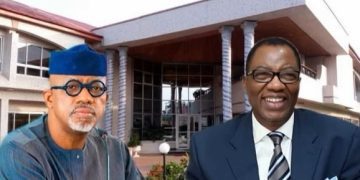How To Raise Someone From Sudden Death To Life – Don
A lecturer at the Federal University of Agriculture(FUNAAB), Abeokuta, Prof. Samuel Adeniran Oluwalana, has revealed the formula for reviving or bringing back to life someone that died suddenly.
Prof. Oluwalana said that an extract from the leaves of “Akoko” (yoruba) plant is the secret antidote of sudden death.
To accomplish the feat, he recommended that a decoction extract from Akoko leaves plant (Newbouldia laevis) be placed in the mouth of anyone that died suddenly, especially children, submitting that the remedy will bring the person back to life.
The Professor of Forest Resources Management who made this known while delivering his lecture titled, ‘Forest: A boundless health and wealth territory,’ also gave insight into how to expel stubborn placenta from the womb after childbirth and tackle other complicated childbirth.
He said that a careful application of palm oil and vulture feather would solve the problem.
“Placenta expulsion after childbirth: Put a feather of Vulture …in West African palm oil, drop the oil in the woman’s mouth using the vulture feather, the placenta will come out immediately,” he said.
According to him, “To turn a baby coming with legs during birth, touch the baby’s leg with Blighiasapida K.D Koenigseed, the baby will withdraw the leg immediately and turn in the womb.”
He spoke on Wednesday at the 72nd inaugural lecture of Federal University of Agriculture (FUNAAB) Abeokuta, where he cited from documented indigenous knowledge, some uses of forest and animal resources for health, commerce and wealth creation.
He wondered why Nigeria that is enormously blessed with vast forest resources should be grappling with apocalyptic poverty and health challenges, citing cancer, diabetes, bile, hypertension, ovarian cyst, STDs, blocked fallopian tube, infertility, fibroids among other health conditions that could be addressed using plants and animal resources from the nation’s enormous forest belt.
The don, therefore, made case for the establishment of Centre of Indigenous Knowledge in public universities as a window for students to explore the wellspring of knowledge and experience that are relevant to people.
Prof. Oluwalana described indigenous knowledge as a gold mine, a veritable source of age – old methods of uses of nature as medicine and wealth, contending that such knowledge would also enhance the establishment of forest archeological studies necessary for forest resource utilisation and conservation.
He also specifically urged FUNAAB to add insects (-including cockroaches, grasshopper, crickets, maggots and butterfly), farming to its portfolio.
Lamenting that the nation’s educational system constricts the mind of students and hinders innovation, he advocated for tests, homework and assignments that would stimulate innovative thinking as obtained in Norway, Singapore, Malaysia and India where education is tailored to individual and national development.
“The educational system in Nigeria appears to constrict the mind and discourage innovation. Interactive education should be vigorously encouraged. Instead of Continuous Assessment Tests, which unfortunately have largely become Continuous Assessment Examinations, tests or homework, assignments that would stimulate innovative thinking should be encouraged.
“We can learn from Norway, Singapore, Malaysia and India among many other nations that prize education for development. Students should be trained to provide answers to pressing societal problems.
“Why should a forestry student not be conversant with the Periodic Table? Why should they not be encouraged to study the Lanthanides and the Actinides? The Periodic Table is a gateway to poverty amelioration.
“The Lanthanides, fifteen in number including promethium(pm), the only radioactive member of the group, are waiting members of ‘milk and honey’ that can spur the wealth of the people and the nation. Indeed, from experience, understanding the Periodic Table is a source of income,” the Professor said.
ADVERTISEMENT








































